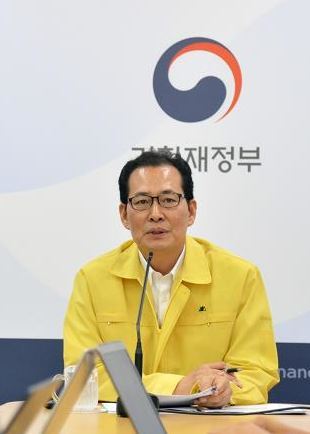The South Korean economy will face some downside risks going forward due to possible labor strikes at local carmakers and a cooldown in the local property market, a vice finance minister said Monday.
"The economy is on an upside cycle for the most part. But the upturn is largely driven by robust overseas sales of semiconductors and brisk facility investment," Vice Finance Minister Ko Hyoung-kwon said in a press briefing in Sejong, an administrative city some 130 kilometers south of Seoul. "Labor strikes at major car companies and a possible downturn in construction investment may weigh heavily on the economy."
 |
This photo provided by the Ministry of Strategy and Finance shows South Korea`s Vice Finance Minister Ko Hyoung-kwon speaking at a press briefing in Sejong on Aug. 21, 2017. (Yonhap) |
He said the government will make all-out efforts to expand government spending using the 11 trillion-won extra budget, which passed the National Assembly last month to buttress Asia's fourth-largest economy.
"If necessary, the government will come up with additional economy stimulus packages," he added.
The South Korean auto industry is bracing for potential walkouts in the upcoming wage-deal season.
Union members of Hyundai Motor Co., South Korea's No. 1 automaker, staged partial strikes last week and warned of further disruptions to protest against the wage increase offer proposed by management. The company said it experienced 24 rounds of labor strikes between July and October last year, which led to missed production of 142,000 cars.
Also, the housing market is cooling down after the government announced a set of measures to root out real estate speculation. The government designated Seoul and two other cities as "overheated speculative districts" in a move to stabilize the country's overheating housing market, while multiple-home owners will be forced to pay higher capital gains taxes when they sell their houses.
"Construction investment has played a big role in propping up the economy in the first six months," Ko said. "A contraction in the real estate market is a clear downside pressure on the economy."
South Korea's GDP grew 1.1 percent in the first quarter and 0.6 percent in the following three-month period, raising concerns that the economy is slowing down. (Yonhap)








![[Today’s K-pop] Blackpink’s Jennie, Lisa invited to Coachella as solo acts](http://res.heraldm.com/phpwas/restmb_idxmake.php?idx=644&simg=/content/image/2024/11/21/20241121050099_0.jpg)